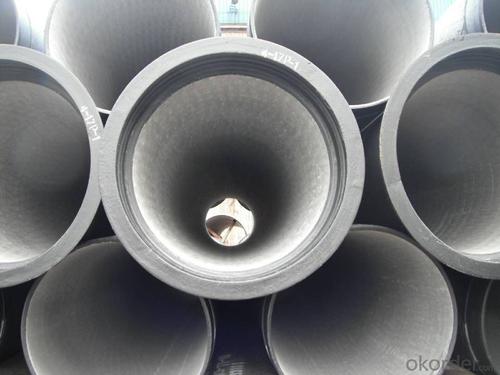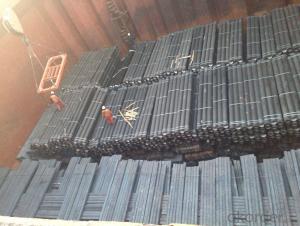DUCTILE IRON PIPE DN150 K9/C
- Loading Port:
- China Main Port
- Payment Terms:
- TT OR LC
- Min Order Qty:
- -
- Supply Capability:
- -
OKorder Service Pledge
OKorder Financial Service
You Might Also Like
Specification:
1) The standard of pipe: ISO2531:1998, K9
2) Effective length: 6m
3) Inner cement line: Portland cement line as per ISO4179
4) Zinc coating: at least 130g/m2 as per ISO8179
5) Bitumen painting: at least 70um as per ISO8179
6) With 100% quantity of NBR ring, or SBR ring, or EPDM ring as per ISO4633
7) DN80mm-800mm
8) High strength, lighter than grey iron, good corrosion resistance, no furring, small flow resistance, easy fixing, long life tome about 100 yeas
9) Produced by Hangzhou chunfeng machine
10) Checked by automatic inspection equipment
11) Composition:
Chemical composition | |||
Chemical composition | Ductile Cast Iron Pipe (%) | Grey iron pipe (%) | Steel pipe (%) |
C | 3.5-4.0 | 3.2-3.8 | 0.1-0.2 |
Si | 1.9-2.6 | 1.4-2.2 | 0.15-0.4 |
Mn | 0.15-0.45 | 0.4-0.6 | 0.3-0.6 |
P | ≤0.06 | ≤0.3 | 0.02-0.03 |
S | ≤0.02 | ≤0.1 | 0.02-0.03 |
Mg | 0.03-0.06 |
|
|
12) Feature:
Mechanical properties | |||
| Ductile Cast Iron Pipe | Grey Iron Pipe | Steel Pipe |
Tensile Strength(Mpa) | ≥420 | 150-260 | ≥400 |
Yield Strength(Mpa) | ≥300 | No Confirmation | No Confirmation |
Bending Strength(Mpa) | ≥590 | 200-360 | ≥400 |
Elongation (%) | ≥10 | Neglected | ≥18 |
Brinell Hardness(HBS) | ≤230 | ≤230 | About 140 |
13) T type mechanical joint
14) Packing: in bulk or container
- Q: What is the lifespan of ductile iron pipes?
- The durability and longevity of ductile iron pipes can vary depending on several factors, including pipe quality, installation conditions, and the surrounding environment. On average, these pipes typically last between 50 and 100 years, making them an excellent choice for water and sewer infrastructure. By implementing proper maintenance practices and conducting regular inspections, ductile iron pipes can remain highly functional and efficient for many decades. It should be noted that factors such as corrosion, soil conditions, and water chemistry can influence the lifespan of these pipes, so it is important to monitor and address these issues in order to extend their longevity.
- Q: What is the relationship between continuous cast iron pipe and ductile iron pipe?
- In general, the continuous cast iron pipe is the continuous casting of gray cast iron pipe, while the centrifugal cast iron pipe is centrifugal ductile iron pipe. Of course, you have to be hard, just to make continuous ductile iron pipes, that's what you want.
- Q: Can ductile iron pipes be used for pressure relief systems?
- Indeed, pressure relief systems can make use of ductile iron pipes. Renowned for their robustness, longevity, and capacity to endure intense pressure circumstances, ductile iron pipes possess a remarkable resilience against both internal and external pressures. Consequently, they prove to be ideal for deployment within pressure relief systems. Furthermore, ductile iron pipes can withstand considerable fluctuations in pressure without jeopardizing their structural integrity. Consequently, they find widespread usage in various settings necessitating pressure relief systems, including water supply networks, wastewater treatment facilities, and industrial operations.
- Q: Are ductile iron pipes suitable for bridge crossings or crossings under roadways?
- Bridge crossings or crossings under roadways can be easily accommodated with ductile iron pipes. These pipes possess remarkable strength, durability, and resistance against external forces like heavy traffic loads and bridge movements. With their high tensile strength, they can endure the stress and strain caused by vehicles passing over them. Furthermore, ductile iron pipes exhibit exceptional corrosion resistance, rendering them suitable for underground installations that may come into contact with water or other corrosive elements. Additionally, their long lifespan and minimal maintenance requirements make them a dependable choice for bridge crossings or crossings under roadways. Consequently, ductile iron pipes offer a cost-effective and efficient solution for such infrastructure projects.
- Q: Are ductile iron pipes suitable for irrigation systems in agricultural fields?
- Yes, ductile iron pipes are suitable for irrigation systems in agricultural fields. Ductile iron pipes have excellent strength, durability, and corrosion resistance, making them ideal for carrying water in irrigation systems. They can withstand high pressure and heavy loads, ensuring reliable water supply to agricultural fields for irrigation purposes.
- Q: Method for cutting cast iron pipe
- Generally cast iron pipe wall thickness, crisp texture, with traditional saw blade, saw blade cutting, very expensive cutting materials, and cutting accuracy is not high. Nowadays, the cutting tools and cutting machines on the market cut off these kinds of pipes, which are fast and cutting tools. Because the length of the pipe is not cut, the pipe can be continuously cut for a while after the equipment is loaded on the equipment. The worker can spare more time and can realize the operation of more than one machine, thus greatly improving the cutting efficiency. Rotary tool pipe cutting machine cutting cast iron pipe sawdust granular, easy chip removal, cutting section of vertical high, smooth surface without burr. The current equipment has been widely used in cast iron pipe cutting, especially iron pipe cutting, even cylinder car production.
- Q: What is the expected joint flexibility of ductile iron pipes?
- The expected joint flexibility of ductile iron pipes is typically high, as they are designed to accommodate slight movements and stresses caused by ground settlement or thermal expansion and contraction.
- Q: What is the expected cyclic fatigue life of ductile iron pipes?
- Various factors such as material composition, pipe design, loading conditions, and environmental factors can affect the expected cyclic fatigue life of ductile iron pipes. However, ductile iron pipes are widely recognized for their exceptional ability to withstand fatigue. Ductile iron pipes are specifically engineered to endure cyclic loading, which is common in water distribution and sewer systems due to fluctuating pressures and vibrations. These pipes possess a unique microstructure that confers high strength and ductility, enabling them to resist crack formation and growth under cyclic loading. Numerous studies and industry standards have provided estimates for the expected cyclic fatigue life of ductile iron pipes. For instance, the American Water Works Association (AWWA) C151 standard recommends a design life of 100 years for ductile iron pipes used in water distribution systems, underscoring their long-term durability and resistance to fatigue. Furthermore, research studies have demonstrated that ductile iron pipes can withstand over 1 million cycles of loading without exhibiting any signs of fatigue failure. The fatigue strength of ductile iron pipes can be further augmented by employing protective coatings or linings to reduce the impact of corrosion and abrasion. Nevertheless, it is important to recognize that various factors, such as manufacturing quality, installation practices, and maintenance procedures, can influence the expected cyclic fatigue life of ductile iron pipes. Regular inspections, appropriate handling, and adherence to recommended installation guidelines can help ensure the longevity and performance of ductile iron pipes. In conclusion, while the expected cyclic fatigue life of ductile iron pipes can be subject to variation due to several factors, these pipes are generally renowned for their outstanding fatigue resistance and offer a dependable and enduring solution for water distribution and sewer systems.
- Q: How does ductile iron pipe resist internal corrosion?
- Ductile iron pipe resists internal corrosion due to the protective barrier formed by its cement lining. This lining acts as a barrier between the iron pipe and the transported fluid, preventing direct contact and minimizing the chances of corrosion. Additionally, the high carbon content in ductile iron enhances its corrosion resistance compared to other types of iron pipes.
- Q: What is the expected pressure class for ductile iron pipes?
- The expected pressure class for ductile iron pipes can vary depending on the specific application and the requirements of the project. However, generally speaking, ductile iron pipes are designed to handle high-pressure applications and are commonly available in pressure classes ranging from 150 psi (pounds per square inch) to 350 psi. These pressure classes indicate the maximum operating pressure that the pipe can withstand while maintaining its structural integrity. It is important to consult with industry standards and guidelines, as well as the project specifications, to determine the appropriate pressure class for ductile iron pipes in a given situation.
Send your message to us
DUCTILE IRON PIPE DN150 K9/C
- Loading Port:
- China Main Port
- Payment Terms:
- TT OR LC
- Min Order Qty:
- -
- Supply Capability:
- -
OKorder Service Pledge
OKorder Financial Service
Similar products
Hot products
Hot Searches
Related keywords

























